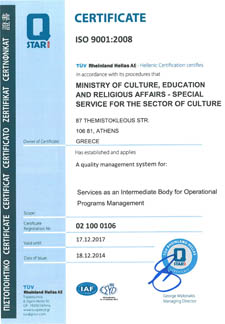The Special Service for the Sector of Culture
Establishment
The Special Service for the Sector of Culture was established by Joint Ministerial Decision ΥΠΠΟ/ΓΝΟΣ/67343/29.12.2000 (Government Gazette No. 1620/B/2000). The name of the Service was initially “Managing Authority of the Operational Programme “Culture” ”, and its purpose was to exercise the competencies defined in Law 2860/2000 – Management, Monitoring and Control of the Third Community Support Framework.
In 2008 Government Gazette No. 2526/B/2008 announced the renaming of the Service to “Special Service for the Sector of Culture”, and it was restructured to meet the needs of the National Strategic Reference Framework (NSRF) and the exercise of the competencies described in Law 3614/2007.
In 2011, after the Ministries of Culture and Tourism were joined together, the Service merged with what was then known as the Special Service for Coordination, Management and Implementation of Actions of the former Ministry of Tourism Development and was named “Special Service for Culture and Tourism” by Joint Ministerial Decision ΕΥΤΟΠ/Δ/ΦVIIIα/266/28.01.2011 (Government Gazette No. 240/B/2011).
In 2013, the Ministry of Education & Religious Affairs, Culture & Sports was reformed to “Ministry of Culture & Sports” and the Service was once again renamed to its previous title: “Special Service for the Sector of Culture” (Joint Ministerial Decision ΕΥΠΟΤ/Δ/ΦVIIIα/885/06-03-2013 - Government Gazette No. 610/B/2013).
Purpose
The main purpose of the Special Service for the Sector of Culture is to manage the actions assigned to it by the Competitiveness and Entrepreneurship Operational Programme– OPCE II, the Human Resources Development Operational Programme, the Attica Regional Operational Programme and the Western Greece – Peloponnese – Ionian Islands Operational Programme with regard to the projects located in the Ionian Islands Region.
Competencies
In brief the competencies of the Special Service are the following:
- Performance of duties of an Intermediate Management Body as defined in Article 4 of Law 3614/2007 on the Operational Programmes Competitiveness and Entrepreneurship, Environment – Sustainable Development, Education and Lifelong Learning, Human Resource Development, Digital Convergence, Administrative Reform, European Territorial Cooperation, Improvement of Accessibility, and on the Regional Operational Programmes of the NSRF, as well as the performance of management body duties as defined in Article 36, paragraph 4 of Law 3614/2007 on the Rural Development Programme and Intermediate Management Body as defined in Article 36 paragraph 7 of Law 3614/2007 on the Fisheries Operational Programme, for actions within the competency of the General Secretariat for Culture of the Ministry of Education and Religious Affairs, Culture and Sports and the bodies it oversees, in accordance with the system of management and control and the principle of sound financial management.
- Exercise of the competencies of planning, coordination, management and monitoring of the implementation of the National Development Programme of the General Secretariat for Culture of the Ministry of Education and Religious Affairs, Culture and Sports and the bodies it oversees.
The competencies and tasks of each Unit of the Special Service for the Sector of Culture are described in detail in the Joint Ministerial Decision on its restructuring. (Government Gazette No. 610/B/2013)
Certification ISO 9001:2008
The Special Service for the Sector of Culture has been certified according to ISO 9001:2008.

Related Files:
Government Gazettes
Contact Us
Last modification date: 05/08/2022